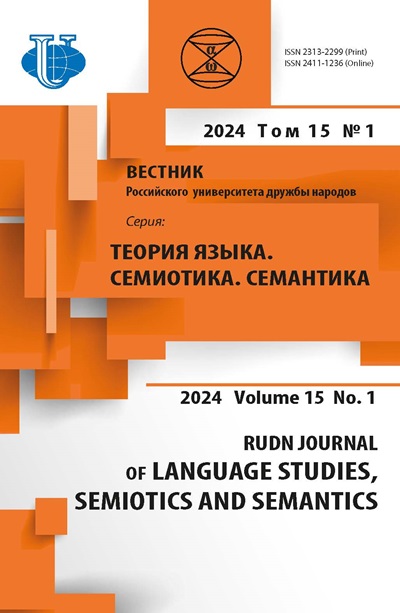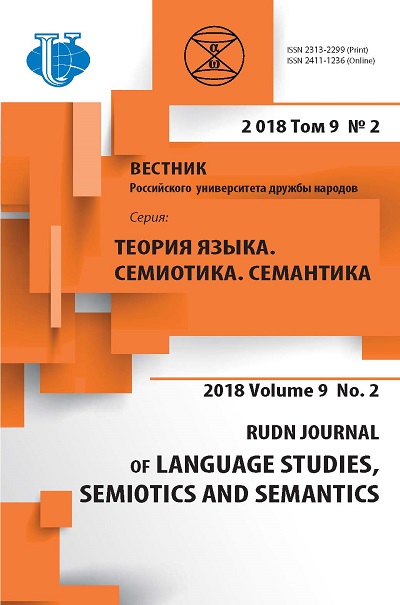REPRESENTATION OF THE DICTIONARY IN THEORETICAL AND EDUCATIONAL LEXICOGRAPHY
- Authors: Nesova N.M.1, Bobritskikh L.Y.2
-
Affiliations:
- RUDN University
- Voronezh State University
- Issue: Vol 9, No 2 (2018)
- Pages: 439-450
- Section: LEXICOGRAPHY
- URL: https://journals.rudn.ru/semiotics-semantics/article/view/18754
- DOI: https://doi.org/10.22363/2313-2299-2018-9-2-439-450
Cite item
Full Text
Abstract
The article is devoted to the main issues of studying modern lexicographic science, its theoretical and educational direction. The concept of lexicography, the main types of dictionaries of Russian and English are considered. The linguocentric and anthropocentric approaches to the study of science are analyzed. Distinctive features of educational lexicography are the consideration of methodological requirements, the specificity of the approach to the selection of material in dictionaries. In lexicographic practice, theoretical research is carried out in the study of ways to identify and semantize cultural information. The article is devoted to the main issues of studying contemporary lexicographic science; practical and theoretical approaches in considering the macrostructure of bilingual dictionaries. The basis of lexicographical design, planning and organization of vocabulary work is described. The relationship in the dictionary of linguistic and extralinguistic information is a significant issue for modern lexicography. Bilingual dictionaries are considered as a repository of culture on the one hand, and on the other - as bridges between different cultures, representing not only linguistic forms, but also cultural facts. The inclusion of the cultural component in the composition of the dictionary entry corresponds to the anthropocentric orientation of modern lexicographic science. The article considers the main types and specifics of bilingual dictionaries, their typological functions based on the classification of user skills.
About the authors
Natalya Mikhailovna Nesova
RUDN University
Author for correspondence.
Email: natalya_nesova@list.ru
Candidate of Philology, Associate Professor of the Department of Foreign Languages, RUDN University; scientific interests: theoretical grammar, linguistics, intercultural communication
6 Mikluho-Maklay Str., Moscow, Russia, 117198Lyudmila Yakovlevna Bobritskikh
Voronezh State University
Email: kafruslit@gmail.com
Candidate of Philology, Associate Professor of the Department of History and Typology of Russian and Foreign Literature, Voronezh State University; scientific interests: theory and history of literature, theoretical grammar, intercultural communication
1 University Square Str., Voronezh, Russia, 394018References
- Nesova, N.M. (2016). Representation of the entry in bilingual dictionaries. RUDN Journal of Language Studies, Semiotics and Semantics, 7(3), 202—208.
- Hartmann, R.R.K. (2001). Teaching and Researching Lexicography (Applied Linguistics in Action Series). Harlow: Pearson Education Limited.
- Wiegand, H.E. (1983). On the Structure and Content of a General Theory of Lexicography In Proceedings Papers from the International Conference on Lexicography. Exeter 9—12 September, 13—20.
- Hartmann, R.K. & James, G. (1998). Dictionary of lexicography. New York: Routledge, 49—54.
- Zgusta, L. (1971). Manual of lexicography. Prague: Academia.
- Atkins, B.T. & Rundell, M. (2008). Oxford Guide of Practical Lexicography. New York: Oxford University Press.
- Gak, V.G. (1995). Sociocultural aspect of bilingual dictionaries. Dictionary and Culture. Moscow.
- Piotrowski, T. (1994). Problems in bilingual lexicography. Wroclaw: Wydawnictwo Uniwersytetu Wroclawskiego, 235—267.
- Mugdan, J. (1992). On the typology of bilingual dictionaries. In: Symposium on lexicography V. Proceedings of the Fifth International. Symposium on Lexicography May 3—5, 1990 at the University of Copenhagen. Tubingen: Max Niemeyer Verlag. K. Hyldgaard-Jensen—A. Zettersten (Eds.), 17—24.
- Marello, C. (1999). The Bilingual Dictionary: Definition, History, bidirectionality, in Lexicography: Critical Concepts. Vol. 2: Reference works across time, space and languages. London: Routledge. Reinhard Rudolf Karl Hartmann (Ed.), 325—342.
- Al-Kasimi, A. (1997). Linguistics and bilingual dictionaries. Leiden: E.J. Brill, 246—273.
- Landau, S.I. (2001). Dictionaries: The Art and Craft of Lexicography. Cambridge: Cambridge University Press, 86.
- Morkovkin, V.V. (1990) Fundamentals of the theory of educational lexicography [dissertation]. Moscow.
- Denisov, P.N. (1977). Typology of educational dictionaries. Problems of educational lexicography. P.N. Denisov & V.V. Morkovkin (Ed.). Moscow, 23—42.
- Denisov, P.N. (1974). Essays on Russian lexicology and educational lexicography. Moscow: Mos. University publ.
- Suprun, A.E. (1976). Some properties of a vocabulary and a vocabulary for a teacher. Scientific and methodological foundations of the compilation of educational dictionaries of the Russian language for non-Russian and the problems of teaching vocabulary.Moscow. 94—111.
- Apresyan, Yu.D. (1993). Selected Works: In 2 volumes. M.: Languages of Russian Culture. Moscow.
- Dubchinsky, V.V. (1994). The art of creating dictionaries: Summaries in lexicography. Kharkov: Kharkov lexicographical society.
- Morkovkin, V.V. (1988). Anthropocentric versus linguocentric approach to lexicography. National specificity of language and its reflection in the normative vocabulary. Moscow, 133—141.
- Gerd, A.S. (1977). To the definition of the concept of the dictionary. Problems of lexicography. St. Petersburg, 58—63.
- Minayeva, L.V. (2007). Lexicology and lexicography of the English language. Moscow: AST, Astrel publ.
- Hartmann, R.K. (1983). On Theory and Practice. Lexicography: Principle and Practice. London; New York: Academic Press, 3—11.
- Lehman, C. Lexicography. URL: http://www.christianlehmann.eu/ling/ling_meth/ ling_description/ index.html (accessed 11.10.2015).
- McArthur, T. (1998). Living Words. Language, Lexicography and the Knoweledge Revolution. Exeter: University of Exeter Press.
- Mugglestone, L. (2011). Dictionaries: A Very Short Introduction. N.Y.: Oxford University Press.
- Roberts, R. (2004). Dictionaries and Culture. In: 2007 Dictionary vision, research and practice: Selected papers from the 12th International Symposium on Lexicography, Copenhagen. Amsterdam: John Benjamins, H.Gottlieb, J.E. Mogensen, 277—297.













